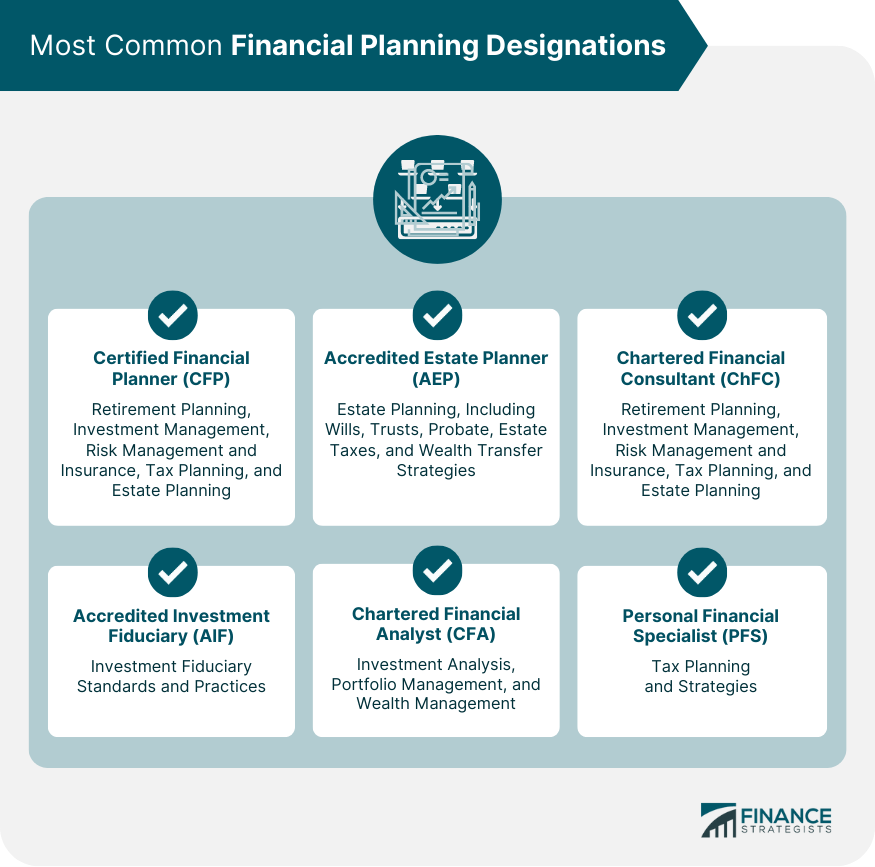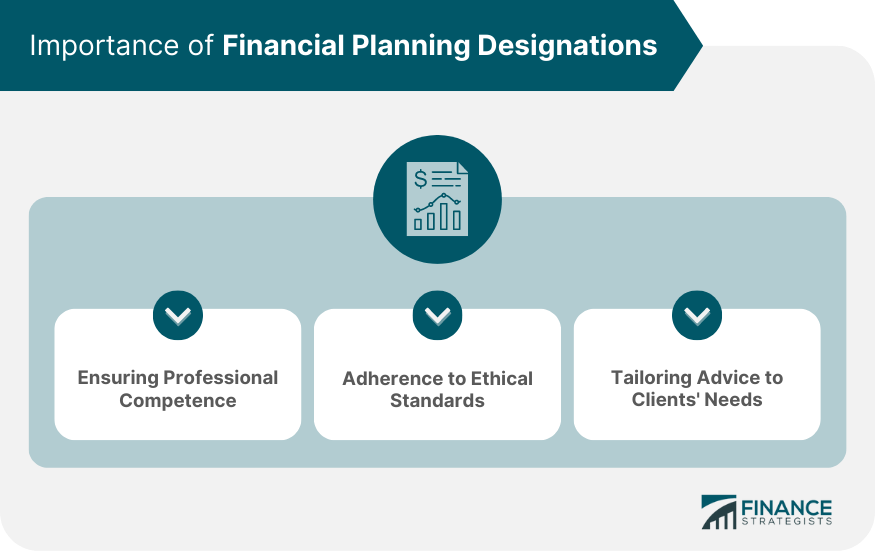Financial planning designations play a crucial role in ensuring that professionals who offer financial planning services possess the necessary knowledge, skills, and ethical standards. These designations serve as indicators of expertise in specific areas of financial planning, helping clients make informed decisions when selecting a financial planner. There are numerous financial planning designations available, each with its own set of requirements and areas of expertise. Some of the most common designations include: the Certified Financial Planner (CFP), Chartered Financial Analyst (CFA), Chartered Financial Consultant (ChFC), Accredited Investment Fiduciary (AIF), Accredited Estate Planner (AEP), and Personal Financial Specialist (PFS). The Certified Financial Planner (CFP) designation is one of the most recognized and respected financial planning designations. To earn the CFP designation, candidates must meet specific education, examination, experience, and ethical requirements. This includes completing a comprehensive financial planning curriculum, passing a rigorous examination, accruing a certain number of work experience hours, and adhering to the CFP Board's Code of Ethics and Standards of Conduct. CFP professionals possess expertise in various areas of financial planning, including retirement planning, investment management, risk management, insurance, tax planning, and estate planning. CFP professionals are required to act as fiduciaries, meaning they must put their clients' best interests ahead of their own when providing financial advice and recommendations. The Chartered Financial Analyst (CFA) designation is a globally recognized credential for investment professionals. To earn the CFA designation, candidates must pass a series of three rigorous examinations, complete a minimum of four years of relevant work experience, and adhere to the CFA Institute's Code of Ethics and Standards of Professional Conduct. CFA charterholders possess expertise in investment analysis, portfolio management, and wealth management, making them valuable resources for clients seeking investment advice and management. While the CFA designation is primarily focused on investment analysis and management, CFA charterholders can also provide valuable financial planning advice, especially in areas related to investments and portfolio management. The Chartered Financial Consultant (ChFC) designation is another respected credential in the financial planning field. To earn the ChFC designation, candidates must complete a comprehensive financial planning curriculum, pass a series of exams, and adhere to the American College of Financial Services' Code of Ethics. ChFC professionals possess expertise in various areas of financial planning, including retirement planning, investment management, risk management, insurance, tax planning, and estate planning. The ChFC designation is similar to the CFP in terms of areas of expertise; however, the ChFC curriculum is often considered to be more in-depth and does not require candidates to pass a comprehensive, final examination like the CFP. The Accredited Investment Fiduciary (AIF) designation focuses on investment fiduciary standards and practices. To earn the AIF designation, candidates must complete a training program, pass an examination, and adhere to the Centre for Fiduciary Studies' Code of Ethics and Conduct Standards. AIF professionals specialize in fiduciary standards and practices, making them well-equipped to help clients navigate the complexities of investment management and the responsibilities associated with fiduciary duty. AIF professionals prioritize their clients' best interests when providing investment advice and recommendations, ensuring that they adhere to fiduciary standards and act in their clients' best interests. The Accredited Estate Planner (AEP) designation is a distinguished credential for professionals involved in estate planning. To earn the AEP designation, candidates must meet specific education, experience, and ethical requirements, including completing a comprehensive estate planning curriculum and possessing a minimum of five years of relevant work experience. They must also adhere to the National Association of Estate Planners & Councils' Code of Ethics. AEP professionals possess expertise in estate planning, including wills, trusts, probate, estate taxes, and wealth transfer strategies, making them valuable resources for clients seeking assistance with preserving and transferring their wealth to future generations. AEP professionals play a critical role in helping clients develop comprehensive estate plans that meet their specific needs and goals, providing expert advice on various aspects of estate planning and wealth transfer strategies. The Personal Financial Specialist (PFS) designation is a credential awarded by the American Institute of Certified Public Accountants (AICPA) to CPAs who specialize in personal financial planning. To earn the PFS designation, candidates must meet specific, including being a licensed CPA, completing a comprehensive financial planning curriculum, passing an examination, and accruing a certain number of work experience hours in personal financial planning. PFS professionals possess expertise in various areas of financial planning, with a particular focus on tax planning and strategies, making them valuable resources for clients seeking tax-efficient financial planning advice. PFS professionals are well-versed in tax planning strategies and are uniquely positioned to provide tax-efficient financial planning advice due to their extensive knowledge of tax laws and regulations. Financial planning designations help ensure that professionals offering financial planning services possess the necessary knowledge, skills, and expertise to provide competent financial advice tailored to their clients' unique needs and goals. Credentialed financial planning professionals are required to adhere to specific ethical standards and maintain a commitment to professional conduct, providing clients with unbiased and trustworthy advice. Financial planning designations enable professionals to specialize in various areas of financial planning, ensuring that they can provide tailored advice and solutions to clients with diverse financial needs and goals. Selecting the right financial planner is a critical step in achieving your financial goals and maintaining your financial well-being. Financial planning designations serve as valuable indicators of a professional's expertise, commitment to ethical standards, and ability to provide tailored advice to clients with diverse financial needs and objectives. By understanding the various financial planning designations and their areas of expertise, you can make an informed decision when choosing a professional to guide you through the complexities of personal finance. Working with a credentialed financial planner can help ensure that you receive competent, ethical, and trustworthy advice tailored to your unique needs and objectives. These professionals adhere to specific ethical standards and maintain a commitment to professional conduct, providing clients with unbiased and trustworthy advice. By taking the time to research, evaluate, and select a qualified financial planner with the appropriate designations, you can confidently work towards achieving your financial goals and securing your financial future.Financial Planning Designations: Overview
Certified Financial Planner (CFP)
Requirements for CFP Designation
Areas of Expertise
Fiduciary Duty
Chartered Financial Analyst (CFA)
Requirements for CFA Designation
Areas of Expertise
Role in Financial Planning
Chartered Financial Consultant (ChFC)
Requirements for ChFC Designation
Areas of Expertise
Comparison to CFP
Accredited Investment Fiduciary (AIF)
Requirements for AIF Designation
Areas of Expertise
Focus on Fiduciary Responsibility
Accredited Estate Planner (AEP)
Requirements for AEP Designation
Areas of Expertise
Role in Estate Planning
Personal Financial Specialist (PFS)
Requirements for PFS Designation
Areas of Expertise
Focus on Tax Planning

Importance of Financial Planning Designations
Ensuring Professional Competence
Adherence to Ethical Standards
Tailoring Advice to Clients' Needs

Conclusion
Financial Planning Designations FAQs
A financial planning designation is a professional certification that indicates an individual has met certain education, experience, and ethical requirements in the field of financial planning. Some popular financial planning designations include the Certified Financial Planner (CFP), Chartered Financial Consultant (ChFC), and Personal Financial Specialist (PFS).
Working with a financial planner who has a designation can give you confidence that the planner has the knowledge, skills, and ethical standards required to provide sound financial advice. Designations often require rigorous education and experience requirements, as well as ongoing continuing education, to maintain the certification.
The Certified Financial Planner (CFP) and Chartered Financial Consultant (ChFC) designations both indicate that the holder has met certain education and experience requirements in the field of financial planning. However, the CFP designation is more focused on comprehensive financial planning, while the ChFC designation is more focused on insurance planning.
The Personal Financial Specialist (PFS) designation is a professional certification offered by the American Institute of Certified Public Accountants (AICPA). It indicates that the holder is a Certified Public Accountant (CPA) with additional education and experience in the area of personal financial planning.
When evaluating a financial planner's designation, look for designations that are accredited by a recognized organization, such as the National Commission for Certifying Agencies (NCCA) or the Accreditation Council for Accountancy and Taxation (ACAT). You can also check the planner's credentials with the issuing organization to verify that they are in good standing.
True Tamplin is a published author, public speaker, CEO of UpDigital, and founder of Finance Strategists.
True is a Certified Educator in Personal Finance (CEPF®), author of The Handy Financial Ratios Guide, a member of the Society for Advancing Business Editing and Writing, contributes to his financial education site, Finance Strategists, and has spoken to various financial communities such as the CFA Institute, as well as university students like his Alma mater, Biola University, where he received a bachelor of science in business and data analytics.
To learn more about True, visit his personal website or view his author profiles on Amazon, Nasdaq and Forbes.











